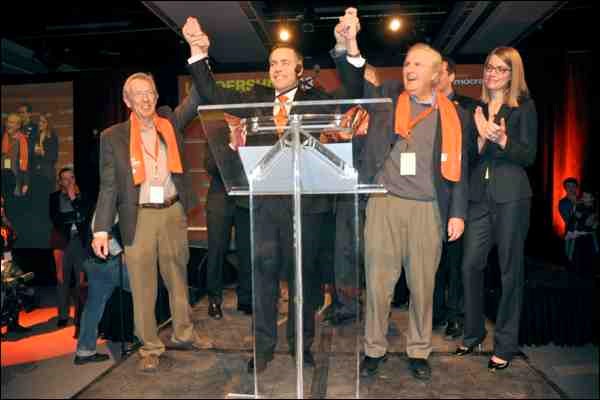2013 was a big year of happenings in provincial politics.
The Saskatchewan Party government could point to a year of accomplishments and steady economic growth, while the opposition NDP chose a new leader and set forth on its own rebuilding efforts.
The Battlefords were a big part of the provincial political equation in 2013.
The focus early in 2013 was on the NDP as it engaged in a vigorous and closely contested leadership race involving four individuals: Cam Broten, Ryan Meili, Erin Weir and Trent Wotherspoon.
The four contenders all made it to the Northwest as they campaigned across the province. The Battlefords held an all-candidates forum in late January that attracted a good turnout of local New Democrats including its former MLA, Len Taylor, who was one of Broten's most prominent supporters.
Not long after this event, Weir announced he was dropping out of the leadership race to support Ryan Meili. That meant three individuals were left in the running in the leadership vote on March 9 at TCU Place in Saskatoon, a vote covered by the News-Optimist.
The leadership voting went two ballots and the winner was Broten, by only 44 votes over Meili.
The leader and the party quickly went to work in the legislature. One of the skirmishes they had with the Sask. Party government came in April during what became known locally as the "week of the Battlefords" in the legislature.
During that week the NDP launched a co-ordinated week-long questioning of Saskatchewan Party ministers on Battlefords issues such as Saskatchewan Hospital, the Maple Leaf Foods closure and issues at Living Sky School Division.
In an interview with the News-Optimist in July, Premier Brad Wall recounted that tumultuous week.
It was "interesting to watch that," said Wall, adding that when he was in opposition the NDP government "never seemed to talk about North Battleford, even though the MLA was from here, as much as they have rediscovered the constituency in opposition."
On the government side of the house it was an active year. Finance Minister Ken Krawetz brought in a balanced budget in March, one that included $6 million allocated in the budget to SaskBuilds for preparatory work for P3 (public private partnership) opportunities - opportunities which included Saskatchewan Hospital.
"Saskatchewan Hospital is needed, it is a priority," said Krawetz at a budget presentation in North Battleford hosted by the Chamber of Commerce in April.
"Whether it is a P3 - that's what SaskBuilds is going to be tasked with doing." Krawetz turned to Battlefords MLA Herb Cox and added "Herb, the sooner we can get this one going, the less times you'll be barking at me, which is good."
Locally, Battlefords MLA Herb Cox received a new assignment in 2013 as a member of the committee that toured the province on the issue of traffic safety.
That committee filed its report in late August and recommended tougher penalties for drinking and driving, more communication on the dangers of distracted driving and expanded photo radar.
The end of STC bus service on the Blaine Lake to North Battleford route as of May 18 was a topic of discussion in the legislature. It was one of three routes that were cut due to low ridership.
The news prompted disappointment from Mayor Ian Hamilton and criticism from the NDP, who claimed the move risked leaving people stranded for medical appointments. But the minister responsible for STC, Highways Minister Don McMorris, defended the decision in the legislature by saying "tough decisions have to be made."
On the federal scene, Premier Brad Wall called for, and lobbied for, the abolition of the Senate in 2013.
"It's unelected, it's unaccountable, it's unnecessary, it's 100 million dollars we can spend somewhere else," Wall told the News-Optimist.
It was a change from the previous position when he had called for an elected Senate. But Wall had come to the view that such reform was "impossible."
"It's never going to happen," Wall said.
A vote of party membership also supported Senate abolition. But Wall's call for abolition largely fell flat with other premiers at a summit at Niagara on the Lake.
One of those attending reportedly quipped, "we shouldn't abolish the Senate, we should abolish Mike Duffy," referring to one of the Senators embroiled in the Senate expenses scandal that dominated Canadian politics in 2013.
Several other issues were prominent in 2013. One of them was the issue of bullying, particularly on social media.
Saskatoon MLA Jennifer Campeau went on a consultation tour of the province that included a stop in the Battlefords in June, which was the first of a series of consultation sessions. The education ministry announced plans to act on her recommendations in the fall.
The issue of long-term care, and conditions for seniors in those care homes, proved a hot topic during the fall of 2013 as the NDP opposition hammered the government on the issue.
New leader Cam Broten went on a tour of the province getting feedback on the issue, and health care region CEOs went on tours of facilities to see the situation first hand. The report that came back in the fall identified concerns with such areas as food, care, safety and aging infrastructure.
In response, Health Minister Dustin Duncan announced an initial commitment of $10 million to long-term care in October, but that was later bolstered up in December to $10.4 million to address urgent issues and $3.8 million to address ongoing pressures.
Layoffs at Potash Corp. were another issue dominating discussion in December, as 440 employees were let go from their Saskatchewan operation.
Premier Wall penned a strongly worded letter to Potash Corp. on the layoffs. The premier "was upset with some of the things, the way it was done," said MLA Herb Cox.
The premier, said Cox, "had some concerns about it and he expressed them, and more power to him for doing that."




